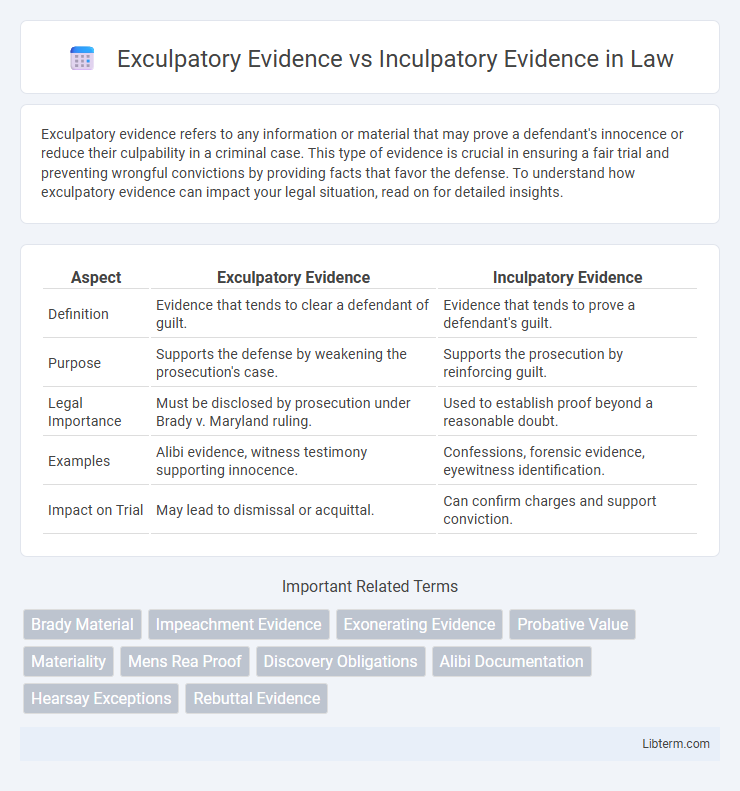Exculpatory evidence refers to any information or material that may prove a defendant's innocence or reduce their culpability in a criminal case. This type of evidence is crucial in ensuring a fair trial and preventing wrongful convictions by providing facts that favor the defense. To understand how exculpatory evidence can impact your legal situation, read on for detailed insights.
Table of Comparison
| Aspect | Exculpatory Evidence | Inculpatory Evidence |
|---|---|---|
| Definition | Evidence that tends to clear a defendant of guilt. | Evidence that tends to prove a defendant's guilt. |
| Purpose | Supports the defense by weakening the prosecution's case. | Supports the prosecution by reinforcing guilt. |
| Legal Importance | Must be disclosed by prosecution under Brady v. Maryland ruling. | Used to establish proof beyond a reasonable doubt. |
| Examples | Alibi evidence, witness testimony supporting innocence. | Confessions, forensic evidence, eyewitness identification. |
| Impact on Trial | May lead to dismissal or acquittal. | Can confirm charges and support conviction. |
Introduction to Exculpatory and Inculpatory Evidence
Exculpatory evidence refers to any information or material that can prove a defendant's innocence or reduce their culpability in a criminal case. Inculpatory evidence, on the other hand, includes facts or items that suggest a defendant's involvement or guilt in the alleged offense. Understanding the distinction between exculpatory and inculpatory evidence is crucial for ensuring a fair trial and proper evaluation of case strength by the legal system.
Definition of Exculpatory Evidence
Exculpatory evidence refers to any information or material that may prove a defendant's innocence or reduce their culpability in a criminal case. This type of evidence can include witness statements, physical evidence, or expert testimony that contradicts the prosecution's claims. Its identification is crucial for ensuring a fair trial and preventing wrongful convictions.
Definition of Inculpatory Evidence
Inculpatory evidence refers to information or material that suggests or proves a defendant's involvement in a crime, thereby supporting the prosecution's case. This type of evidence includes eyewitness testimony, forensic data, or confessions that directly link the suspect to the criminal act. Understanding inculpatory evidence is crucial for distinguishing it from exculpatory evidence, which tends to absolve or reduce a defendant's culpability.
Key Differences Between Exculpatory and Inculpatory Evidence
Exculpatory evidence serves to prove the defendant's innocence by negating guilt or reducing culpability, whereas inculpatory evidence directly implicates the defendant in the commission of a crime. The key difference lies in their roles during legal proceedings: exculpatory evidence favors the defense by creating reasonable doubt, while inculpatory evidence supports the prosecution's case by establishing elements of the offense. Understanding this distinction is critical for legal strategy, evidence disclosure, and ensuring a fair trial under the Brady Rule.
Legal Importance of Exculpatory Evidence
Exculpatory evidence plays a critical role in the legal system by potentially clearing a defendant of guilt or reducing criminal liability, ensuring a fair trial. Its disclosure is mandated by the Brady v. Maryland ruling, requiring prosecutors to provide any evidence favorable to the defense that could exonerate the accused. The failure to present exculpatory evidence can lead to wrongful convictions and violations of due process, emphasizing its significance in upholding justice.
Role of Inculpatory Evidence in Criminal Trials
Inculpatory evidence plays a crucial role in criminal trials by directly linking the defendant to the alleged crime, thereby supporting the prosecution's case. This type of evidence, which includes eyewitness testimony, forensic results, and confessions, helps establish guilt beyond a reasonable doubt. Its effectiveness hinges on its credibility and relevance, often determining the trial's outcome by influencing the judge or jury's perception of the defendant's involvement.
Disclosure Obligations and Brady Rule
Exculpatory evidence refers to information favorable to the defendant that may exonerate or reduce their liability, while inculpatory evidence supports the prosecution's case by demonstrating guilt. Under the Brady Rule, prosecutors are legally obligated to disclose all exculpatory evidence to the defense, ensuring a fair trial and preventing wrongful convictions. Failure to disclose such evidence can result in the reversal of convictions or sanctions, highlighting the critical disclosure obligations in criminal proceedings.
Impact on Verdicts and Appeals
Exculpatory evidence, which tends to prove a defendant's innocence or reduce their culpability, can significantly alter verdicts by introducing reasonable doubt and prompting acquittals or lesser charges. Inculpatory evidence strengthens the prosecution's case by directly linking the defendant to the crime, often resulting in convictions and harsher sentences. During appeals, the discovery of new exculpatory evidence can lead to overturned convictions or retrials, whereas challenges based on inculpatory evidence typically focus on its admissibility or reliability rather than its impact on verdict shifts.
Notable Cases Highlighting Both Types of Evidence
Notable cases such as Brady v. Maryland highlight the critical importance of exculpatory evidence, where withholding such evidence violated the defendant's constitutional rights. In contrast, the O.J. Simpson trial demonstrated the powerful impact of inculpatory evidence, with DNA and forensic data playing a pivotal role in the prosecution's case. These landmark cases underscore how the presentation or suppression of exculpatory and inculpatory evidence can decisively influence judicial outcomes.
Conclusion: Ensuring Fairness in the Justice System
Exculpatory evidence, which can prove a defendant's innocence, and inculpatory evidence, which suggests guilt, both play critical roles in balancing the scales of justice. Ensuring the fair disclosure and analysis of these evidence types upholds the integrity of legal proceedings and protects the rights of the accused. A justice system that rigorously evaluates all evidence promotes fairness, accuracy, and public trust in judicial outcomes.
Exculpatory Evidence Infographic

 libterm.com
libterm.com